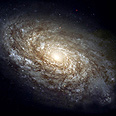
'Gazing at stars will make kids feel less confined'
צילום: נאס"א
Astronaut brings sky to Gazan kids
Former Palestinian NASA employee who lost son in Operation Cast Lead returns to Strip to show children there is a universe beyond Beit Hanoun and Rafah
"When we ask a child here, ‘what do you see in the Gaza sky?’ He would say he sees Apache (helicopters) and F-16s and all of the causes of death and destruction," astronomer Suleiman Baraka says. Despite this, he insists that “the Gaza sky is beautiful with all of its stars and galaxies.”
Baraka, a Gazan-born Palestinian astronomer, who returned to Gaza after his son was killed and his house was demolished in Operation Cast Lead, brings with him the tools to view the entire universe.
Dozens of children will gaze at the stars under the guidance of the former NASA employee using a telescope brought into the Strip with the help of the French Consulate in Jerusalem and the French Cultural Center.
Baraka told Palestinian news agency Maan that he strikes to get Gazan children interested in astronomy to help them overcome what he called the "stereotype" of the sky as a source of death.
The astronomer studied at French universities and went on to work for NASA at the Virginia Tech campus. He was at work in the US in the end of 2008, when his 11-year-old son Ibrahim was killed in a strike on his house in Khan Younis.
Seventeen members of his family were left homeless. In an interview to an American television show he recounted the moment he received the phone call at his office in the US.
“I was in my office. I received a call that there was a bombing in my area, and then, after a while, the bombing was my house, and then I lost communication with the family for ten hours. It was really very hard, at the emotional, psychological level, because I had known that there something happened, and I cannot follow up," he said.
"Ten hours later, I knew that my son Ibrahim was critically injured and my mom was moderately injured when they bombed my house with a one-ton bomb and destroyed the house, injuring my son and my mom.”
Ibrahim was moved to a hospital in Egypt where he died on 5 January 2009.
“My house is not a military base. Ibrahim is eleven years old. He doesn’t need F-16 jet fighters to kill him. My house roof was there for me and my children to use my telescope, not anti-aircraft missiles or rockets.”
Baraka said he returned to Gaza after the war since he felt his homeland needed him. “What would happen if I stayed at NASA with an excellent salary and carrying out research? If you are qualified then it’s better for you to stay in your homeland,” he told Ma’an.
Now in Gaza, Baraka's head is full of potential projects. He plans to establish an observatory and astronomy programs in Gaza's universities. He also plans to open a research center to study the earth's magnetic field.
He told Maan his friends in the world of astronomy will help him transfer the necessary equipment into Gaza despite the limitations at the borders.
The main idea guiding Baraka is that by gazing at the skies, Gazan children will feel less confined in the densely populated Strip. “The universe is wide and the globe is bigger than having Beit Hanoun and Rafah as your only surroundings. Seeing the Gaza sky is an attempt to break the siege in all of its educational and political aspects, in belief that the Palestinians capable of greatness in science.”










